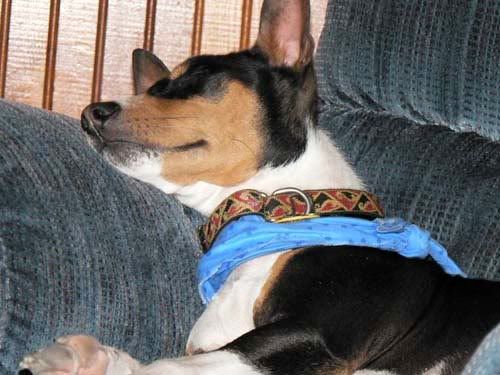Looks like you said that difference in your second post, so we are on the same page.
Whole Dog Journal
-
This is a great magazine for dog owners, they always have great tips… here is one from this latest issue.....
Destructive Chewing: Simple Ways to Prevent and Cure Destructive Chewing
Puppies are notorious for their ability to chew on anything and everything. If you're at all dog-savvy you know when you get a new puppy that despite your best efforts to manage and supervise, you're likely to lose at least one valuable personal possession to the razor-sharp implements known fondly as puppy teeth.Puppies chew to explore their world as well as to relieve the pain and irritation of teething. What many dog owners don't seem to realize is that while puppies sooner or later get beyond the stage where they feel compelled to put their teeth on everything they see, mature dogs also need to chew to exercise their jaws, massage their gums, clean their teeth, and to relieve stress and boredom. It comes as an unpleasant surprise to many owners that chewing doesn't end at the age of six months when all of the dog's adult teeth are grown in.
Puppies develop substrate preferences for elimination in the early months of their lives, and they similarly develop chew-object preferences. Hence the inadvisability of giving your old shoes or socks as chew toys.
If you give your baby dog the run of the house and he learns to chew on Oriental carpets, sofa cushions, and coffee table legs, you will likely end up with a dog who chooses to exercise his jaws and teeth on inappropriate objects for years to come. You'll find yourself crating him frequently even as an adult dog, or worse, exiling him to a lonely life in the backyard, where he can chew only on lawn furniture, loose fence boards, and the edges of your deck and hot tub.
Instead, focus your dog's fangs on approved chew toys at an early age and manage him well to prevent access to your stuff. In this way, he'll earn house privileges much sooner in life. By the end of his first year, you'll probably be able to leave him alone safely while you go out to dinner or shopping - or even while you're away at work.
For more details and advice on ways to prevent and cure destructive chewing habits, purchase Whole Dog Journal's ebook, Simple Ways to Prevent and Cure Destructive Chewing.
